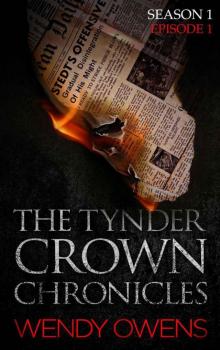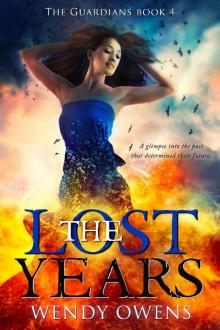- Home
- Wendy Owens
The Day We Died (The Sydney Booth Series Book 1) Page 2
The Day We Died (The Sydney Booth Series Book 1) Read online
Page 2
Growing up, I wrestled with shame and guilt at sharing DNA with someone capable of my father’s actions. I thought when he was executed, all of that pain would somehow magically disappear with his final breath, but I was wrong. Instead, I was angry and more confused than ever. Erasing him from existence didn’t remove the link I shared with him. However it was the birth of my mission to help people. A part of me always felt like we should tell my brother the truth about who our father was, but then I considered the weight that knowledge had been on me. Sometimes, I was jealous of the sister I never got to know. She was adopted by a new family. She would never have to live knowing who her biological father was and what he did.
Once I decided helping people would be how I justified my existence, it became my sole focus. I didn’t have time to date; I had a job to do. After college, I focused on my work and moved up quickly through the ranks. My first job was with the downtown Chicago CSI office. I couldn’t move away from Mom and Michael. The commute was tough, especially during rush hour, so after several years, I transferred to our local office in Clarendon Hills. The equipment at the lab downtown was nicer, and often, the cases were more exciting, but being close to home was more important to me. Considering our lab in Clarendon Hills often has overflow cases from the downtown lab, our office is woefully understaffed, and the hours can be long, but the work feels meaningful.
Most of the time, the life I built is enough, but sometimes, I wish I could have more. The earliest memory of my mother and father is of them slow dancing to songs on the radio in our family room. I always thought they were so in love, and one day, I would find the man I would marry, and we would look at each other the way my parents did. All that was before though. My mother didn’t see my father for who he really was. Can anyone ever truly be trusted if he fooled all of us? I decided when I was thirteen that I was not going to have any children. My mother told me I was too young to speak about such nonsense, but I’m even more confident in my choice all these years later. I won’t let my father’s line continue, not by my doing.
Despite my decision to remove a family from my future, loneliness occasionally creeps in, then I allow myself companionship, but I end it if it ever begins to develop into something serious.
I should end things with my current boyfriend based on my rule. We’ve been together for six months, and it’s my longest relationship to date. The more I get to know him, the more I think maybe he could be a match that makes sense for me.
Several months ago, I was called out to a home that contained a decomposing body. A woman had entered the house to discover the bloated corpse of her deceased father in his bathtub. Fletcher Clarke, a prominent local real estate agent, showed up at the home while I was processing the scene. He informed me the man’s daughter hoped to get the house listed as quickly as possible and wondered how long the process would take.
I informed Fletcher he needed to leave immediately. He replied he would on one condition—if I agreed to have dinner with him. I’d told him we were standing in a house that reeked of a decomposing corpse, not exactly an odor that made one think about food. His only response was that he would definitely be listing it as a fixer-upper. He made me laugh. He still does. Fletcher says we have the best story of how we got together of anyone he has ever met. He loves telling it at parties. The best part about Fletcher is his stance on a family. He doesn’t want one, considering his father was an alcoholic who abused his mother. When he told me having children with his family history felt selfish, I understood him more than I could ever share with him.
Glancing into the bathroom mirror, I notice my cracked lips. I reach into my pocket for the tube of ChapStick, coating them generously.
“Boss wants to see you.” Frankie’s voice interrupts my thoughts.
“Huh,” I grunt. “Oh, thanks.”
“You okay?” she asks. I have worked with Frankie long enough to know she isn’t asking this out of concern for my well-being. Frankie has ambitions, and I learned early in our relationship that she views information as a commodity.
“I’m fine,” I say, clearing my throat and washing my hands.
She shrugs and sighs a big breath as if she’s disappointed by my response. Frankie has never hidden that she thinks the boss fancies me, and that’s why I get preferential case assignments as she refers to them. The truth is I work hard. Harder than most. Most people don’t have a past like mine.
Nobody knows my secrets. I submitted a background check when I was initially hired as a technician, and as a part of that, I included paperwork referencing my name change as a child. My superiors never mentioned it. I’ve never been sure if it was overlooked or simply didn’t matter; I was a child when it occurred. Lots of people have name changes. To most, it probably just appeared to be a footnote.
Frankie stands behind me, silent as if she is waiting for me to say something else. Her thin brown hair is tucked behind her ears, and her red-rimmed glasses perch toward the end of her nose. It feels like she’s studying me. I dry my hands and exit without a word.
My phone vibrates.
My brother texts: I’m going to the grocery, need anything?
Michael has been staying at my condo with me ever since the basement at my mom’s house flooded. What was only supposed to be a few weeks has turned into a few months. Mom suspects the landlord didn’t have flood insurance, and that’s why he’s been dragging his feet on the repairs, but considering he is also her boss, she doesn’t press.
I text back: Who are you, and what have you done with my brother?
He replies: Funny. And just for that, you can get your own groceries.
“Booth,” my boss’s voice booms, and I jerk my head upright as if I were a child being caught doing something I wasn’t supposed to. I shove my phone into my pocket and force a smile.
“Sir—yes, sorry, sir, you needed to see me?” I stammer.
He glances at his wrist as if he’s checking the time, but he hasn’t worn a watch since the one his wife bought him went to the repair shop. These are details I notice. It’s another reason I’m so good at my job. He turns and struts into his office, and I follow, closing the door behind me as I enter. As he takes a seat behind his desk, I awkwardly hesitate, glancing at the chair in front of me and then back at him.
“Well, go on, Booth, have a seat,” he says impatiently, nodding his head toward the chair.
I nod and sit, waiting anxiously for him to reveal the reason for the meeting. He’s looking at his computer screen, and I feel the urge to fill the silence, but my mind is blank. Instead, I stare at the nameplate on his desk. John Foley. The white ridges of the letters have yellowed with age. Supervisor Foley doesn’t spend much time in the field except for the few hours he needs to keep his certifications current. It is the complete opposite of the way my last boss was. A part of me enjoys the freedom Foley’s style gives me.
“How are you handling your current caseload, Booth?” he inquires, not shifting his eye contact from his screen.
I shake my head, a little confused about why he is asking. I do have the heaviest caseload of anyone in the department, but that isn’t anything new. “Just fine, sir.” I know I shouldn’t ask, but I can’t help myself. “Has someone complained about my work?”
“Oh, no.” He chuckles and glances up at me briefly. “Nothing like that. A call just came in, and the next rotation is supposed to go to Frankie, but I’m not comfortable assigning her as the lead on a case like this.”
I try my best not to smile. “Homicide?”
He nods.
“I assure you, I can handle it. I think Blake would say the same.” Blake is the other technician I’m typically sent on cases with. He isn’t exactly bad at his job. He is thorough and collects all the evidence cleanly and professionally. The problem is, Blake never looks beyond the crime scene. When I process a scene, I try to think about what happened. How did the victim end up in the situation? Placing myself in the victim’s mind often leads me to not missing evidence that may be outside what most think are the borders of the crime scene.
“No, Blake is already backed up on processing samples. You’re taking the lead, but I’m sending Frankie out on this one with you.”
“Sir—” I snap instinctively before I bite back my words. Frankie is looking for any opportunity to snatch my title as a shift supervisor, and if I want to prevent that, I need to make sure to always keep my wits about me. The last thing I want in my jacket is a report that says I don’t play well with others.
“Something wrong?” He glares up at me, waiting for my response.
“No, sir, thank you,” I say as I stand and walk to the door.
“Great, I’ll have dispatch send you the location details.”
I nod and open the door, heading in the direction of my office. I spy Frankie in the lab as I pass by and pop my head in.
“Get your kit. You’re with me,” I state, not waiting for a reply before I continue down the hall.
The drive to the crime scene is in complete silence. I consider trying to break the tension a few times, but I always stop myself as I try to think of all the ways Frankie might use what I say out of context against me. It’s hard to have any sort of relationship with someone so calculating.
I place the car in park and exit the vehicle. Frankie heads to the trunk to grab our gear. She’s honestly a pretty good agent, and, if she wasn’t constantly manipulating situations for the benefit of her career, I might have given her high marks on her review. Her ambition sometimes interferes with what’s best for the victims.
“Hi, officer,” I say as I approach the cop guarding the entrance. He nods at me in response. “Has anyone disturbed the scene?”
He shakes his head. “My partner and I were the first ones here. Disp
atch received a request for a wellness check at this location. The door was unlocked and opened a crack when we arrived. We found her in the living room. As soon as we realized she was dead, we exited and called you guys.”
I pat him on his shoulder and smile. “Good work.”
Frankie stands behind me with her kit in one hand and mine in the other. I retrieve my kit from her and enter through the front door. The first thing I notice is there is no odor of decomp. I’ve smelled a lot of dead bodies over my years of being a crime scene technician throughout many different stages of decomposition, so I know what to expect. This scene has to be very fresh.
With a few more steps into the home, I’m in the living room. A woman is lying on the couch. She’s wearing a cream-colored dress that cuts off at her knees. Immediately, I notice she’s also wearing high heels. There’s no sign of blood, and I’m curious how dispatch knew it was a homicide.
I look back at Frankie, who is staring at the victim. “Why don’t you take the room, and I’ll start with her.” I can tell my request has annoyed her by the look on her face, but I refuse to let it bother me.
I place my kit on the ground near the coffee table and open it, unfolding the accordion of layers. I pull on a pair of latex gloves and turn to approach the victim.
When I do, I am instantly frozen. My gaze is immediately drawn to her lips. More specifically, the color of lipstick on them. It’s a fiery-orange shade. If I didn’t know the color was discontinued years ago, I would have thought it was the same shade my father used on his victims. It is called Fire in the Sky. I will never forget that. I know all the details of my father’s case, inside and out. It’s always been a secret obsession of mine. I need to understand every sick and twisted thought that went through my father’s head. I view my close personal knowledge of him as my superpower against fighting other bad guys.
It can’t be, I tell myself. It’s a coincidence. My eyes move down the woman’s face to her neck, where I see ligature marks. That was how they knew it was a homicide. No rope was tied around her throat, only bruises where it had been. Another coincidence, I think to myself, though, I’m starting to shake. My father killed his victims by tying a rope around their necks. In interviews, he told investigators how he would sit on their chest, wrap the rope around his victim’s throats, and stare into their eyes until the light left them. After, he would choose the prettiest dress they owned and dress them in it. Style their hair, put makeup on them, and position them as if they were sleeping peacefully.
I look at the woman in front of me, my chest tightening. Her blonde hair is sculpted around her face, and her cheeks are layered with blush. Her hands are crossed on her stomach, so she’s obviously been positioned there. I stumble slightly, and my eyes grow hot as I stare at the woman who perfectly fits my father’s victim profile.
“What’s with you?” Frankie’s voice cuts through my panic.
My head snaps in her direction. “What?”
“You look like you’ve seen a ghost,” she says.
“I’m fine,” I reply sternly. “Just focus on your job, and I’ll do the same.” I shouldn’t have snapped at her, but I’m rattled.
I pull out the evidence bags and several collection tools from my kit. There has to be an explanation for what I was seeing. The Lipstick Killer is gone because my father’s dead.
The only way I know to keep these ghosts where they belong is to help solve how this woman died. The sooner her killer is captured, the faster I can put my irrational fears to rest. I take a deep breath and exhale before I get to work.
2
I fight the urge to ask Frankie about the evidence she’s collected at the scene. She will only assume I’m checking up on her, and the last thing I want is to give her another motive for disliking me. I am the senior analyst on the case. Her findings flow through me anyway, so I have to be patient.
On the car ride back to the lab, I’m hopeful Frankie will want to discuss the case casually, but she doesn’t. Instead, she wants to talk about other department members she perceives as incompetent. I nod a lot but don’t say anything.
Frankie whips her ponytail around as we exit the car, and I lean back to avoid it hitting me in the face. She’s standing impatiently at the back of the vehicle with her hands on her hips, tapping her foot. I can tell she wants to say something but manages to resist. I take a second to calm my nerves before joining her.
“Do you need any help processing any of your collection?” I ask as I open the trunk and smile at her.
Her mouth drops open, and she looks at me as if she’s insulted by my offer. “I have never had a problem getting my work in on time, thank you!”
“That’s not what I was saying,” I say, trying to defuse the situation. “All I meant was that since you had the entire scene and I only have the victim to process, you may need help.”
She swipes a box of evidence out of the trunk, placing it under one arm, then picks up her kit with her other hand. “I’m used to doing most of the work around here.” She scoffs, flutters her eyes, and then turns in a huff and storms off in the direction of the main entrance. I hate her.
I grab the box of items I collected as well as my kit. Slamming the trunk shut, I turn toward the direction of the entrance, pausing to allow the coroner’s van to pass in front of me. I grip the box tighter under my arm as I cross the rest of the parking lot and head into the building, nodding to Tommy, the security guard at the entrance.
It’s not like this case made me suddenly start thinking about my father. When your dad is a serial killer, not many days pass when you don’t think about him and the lives he destroyed. Today, though, with the similarities I saw in the victim, there’s something more to this case. I don’t have a good feeling about it.
“Macey,” Frankie says when I enter the lab and place my box of evidence on the table in front of her.
“Excuse me?” I ask, then my eyes drift down to her hands to see she holds a wallet in her latex-gloved hands. Damn, she’s fast.
“Her name.” Frankie slides a driver’s license out of a slot in the wallet and turns it to face me. “Macey Price was her name.”
One thing isn’t similar to my father. He liked to keep the driver’s licenses of the women he killed as souvenirs. Of course, if this was some copycat, perhaps that was a detail they overlooked, despite it coming out at the trial. My jaw tenses, and it leads down into my shoulders. I try to relax, but I can tell my discomfort is evident by the way Frankie stares at me.
I’ve been here before. It doesn’t matter how often I tell myself I’m being paranoid; once the irrational idea sets in, I have to disprove it. Once in college, I was sure I saw my father on campus. I was late to a class because I couldn’t shake the notion that it was him until I followed him and verified at close range it wasn’t. Looking back, the incident happened days before my father’s execution was scheduled. It made sense that my subconscious planted the image of him in my mind that day. When I finally caught up to the man who had caught my attention, their build was the only resemblance.
It wasn’t just that time. Once I had a case where it appeared by the evidence that the husband had murdered his wife. I convinced myself it was too obvious, and he had to have been framed. It wasn’t until the husband broke and confessed everything that I managed to admit I was wrong.
This has to be the same scenario. My father was executed. The odds are too slim that a copycat starts killing, using identical signatures, in the same town my family fled to. Nobody knows who we are. When we changed our names, we cut off all contact with everyone from our old lives. If my brother doesn’t know our actual past, how could a stranger?
“What is with you?” Frankie huffs, and I realize I’ve been staring at her.
I shake my head as if I am shaking cobwebs out of my brain and chuckle. “I clearly have not been getting enough sleep.”
“Then do you think you should be processing evidence in a murder investigation?”

 The Sacred Guardians Series Box Set: Books 1-4 Omnibus
The Sacred Guardians Series Box Set: Books 1-4 Omnibus The Tynder Crown Chronicles, Season One: Episode One: The Tynder Crown Chronicles (The Tynder Crown Chronicles, A Novella Series Book 1)
The Tynder Crown Chronicles, Season One: Episode One: The Tynder Crown Chronicles (The Tynder Crown Chronicles, A Novella Series Book 1) The Prophecy (The Guardians)
The Prophecy (The Guardians) Sacred Bloodlines (The Guardians)
Sacred Bloodlines (The Guardians) It Matters To Me (The Wandering Hearts Book 2)
It Matters To Me (The Wandering Hearts Book 2) Blazing Moon: An Adult Urban Fantasy (The Tynder Crown Chronicles Book 2)
Blazing Moon: An Adult Urban Fantasy (The Tynder Crown Chronicles Book 2) The Lost Years (The Guardians Book 4)
The Lost Years (The Guardians Book 4) The Luckiest
The Luckiest Do Anything
Do Anything The Stubborn Love Series: Books 1-5 Contemporary Romance Series
The Stubborn Love Series: Books 1-5 Contemporary Romance Series Stubborn Love
Stubborn Love